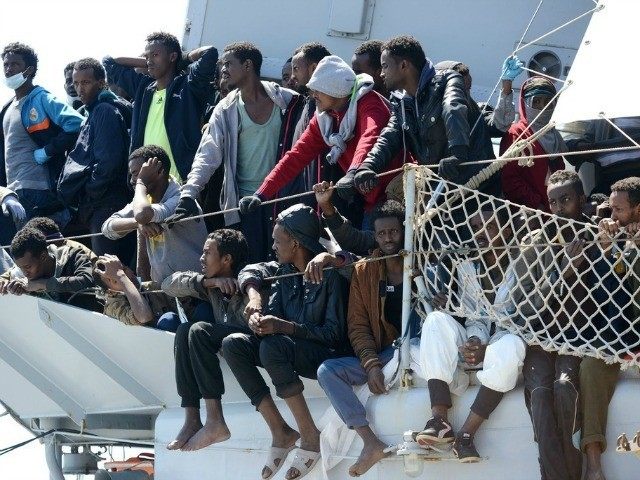The European Union’s summit to deal with the Mediterranean refugee crisis is underway, and based on leaked documents, it appears a major component of the strategy will involve returning most migrants to their countries of origin.
Although there have been calls for the EU to invest more resources in search and rescue operations, it is also feared that generous resettlement policies would inspire an even larger wave of refugees to attempt perilous Mediterranean crossings, to the profit of a rapidly-growing smuggling industry.
According to a “confidential draft summit statement” viewed by the UK Guardian, the emergency crisis package being negotiated in Brussels will include only 5,000 permanent resettlement slots. That is a tiny fraction of the migrant wave slamming into Europe’s Mediterranean nations—36,000 so far this year, 150,000 last year, and up to a million more on the way. Evidently these five thousand resettlements are viewed as a “pilot project,” so the number could be expanded in the future, but clearly the Europeans want to avoid offering inducements that might lead even more people to attempt migration.
The report also says that while funding and resources for maritime patrols will be significantly increased, it will not be the dramatic expansion of search-and-rescue operations to cover almost the entire Mediterranean that human rights activists were hoping for. In fact, the upgraded Operation Triton and Operation Poseidon are still viewed more as border patrol and interdiction missions—”systematic efforts to identify, capture and destroy vessels before they are used by traffickers”—than refugee rescue operations. Cracking down on the smuggling industry seems to be a high priority—high enough that the EU is seriously considering military action against human traffickers.
However, the document also says the EU will restate its commitment to avoid tragedy: “Our immediate priority is to prevent more people dying at sea. We have therefore decided to strengthen our presence at sea, to fight the traffickers, to prevent illegal migration flows and to reinforce internal solidarity.”
More financial and human resources will be allocated to nations such as Italy, Malta, and Greece, which have handled the bulk of the seaborne migration so far, plus Tunisia, Egypt, Sudan, Mali, and Niger, which have seen Libyan refugees cross their land borders.
These measures are unlikely to please activists who complain Europe has not done enough to prevent refugee drownings in the Mediterranean. “The summit comes as a joint letter to EU leaders signed by more than 50 former European prime ministers, foreign ministers and business leaders, condemned the death toll of migrants in the Mediterranean as a ‘stain on the conscience of our continent’ and demanded the immediate restoration of expansive search-and-rescue operations,” writes the Guardian. “Signatories include the former EU commissioner and Conservative party chairman, Chris Patten; the former Swedish prime minister, Carl Bilt; French former foreign minister, Bernard Kouchner; and George Soros of the Open Society Foundation.”
German network Deutsche Welle reports German Chancellor Angela Merkel told her Cabinet on Wednesday that “images of drowned people are incompatible with the values of the European Union,” with her office calling on the EU to make saving lives its highest priority.
On the other hand, U.N. High Commissioner for Refugees Antonio Guterres seemed to echo the EU summit’s determination to crack down on smugglers. “Our ability to save lives at sea has to be guaranteed, because the current situation is a tremendous tragedy,” said Guterres, before adding, “There are people traffickers, and we have to take a very tough line with these people who violate human rights.”
There is sharp disagreement about which of these missions to emphasize in the U.K., with Prime Minister David Cameron supporting a larger expansion of search-and-rescue activity, while Home Secretary Theresa May and Foreign Secretary Philip Hammond emphasized deterrence and cautioned against creating a “pull factor” that would encourage even larger migratory waves.
“May is still holding out for a deterrent approach. She wants to focus on action against the traffickers and a rapid returns program,” a source in Brussels told the Guardian. This source alleged that May and Hammond were partly motivated by “face-saving reasons,” because they were involved in the decision to scale back Italy’s Mare Nostrum rescue operation last year.

COMMENTS
Please let us know if you're having issues with commenting.